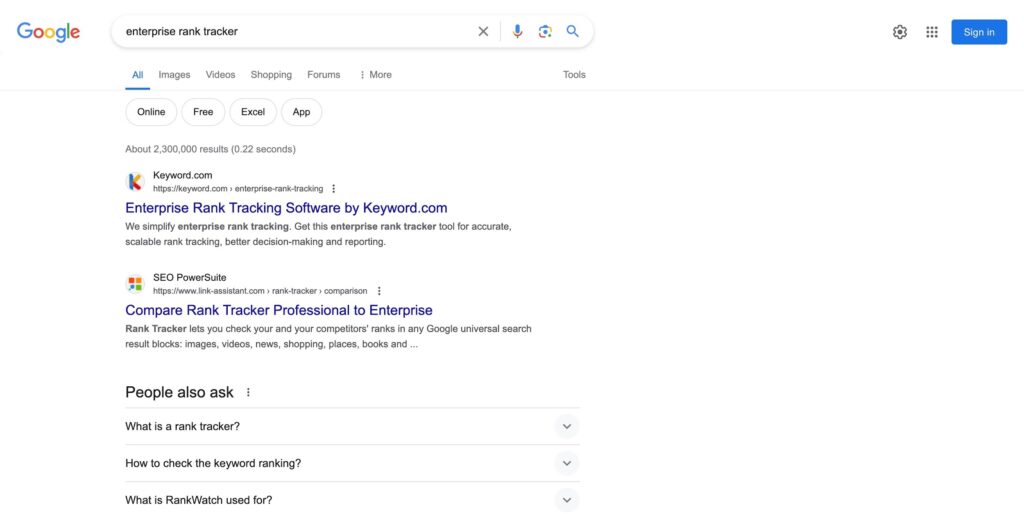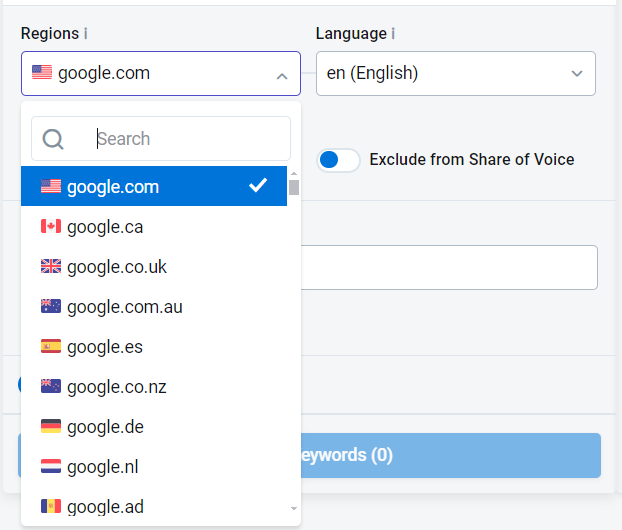Rank tracking accuracy is the most important factor to consider when choosing a keyword monitoring tool. An SEO tool might be easy to use and have many features, but if its data is inaccurate, it will negatively impact your SEO strategy and execution.
Many tools promise accurate SEO rank tracking, but how do you know if their claim is true? A smart thing to do is to test things yourself and draw your own conclusions. In this article, we’ll walk you through the right way to check your rank tracker accuracy before committing to any tool.
Why Do You Need an Accurate Rank Tracker?
Accuracy is the bedrock of your entire SEO strategy. It will help you:
1. Monitor the Effectiveness of Your SEO Strategy
Without accurate tracking, you can’t determine if your efforts are translating into better rankings and, ultimately, more traffic and conversions.
An accurate rank tracker will help you objectively evaluate if the changes in your content, backlinks, or technical SEO efforts positively impact your rankings, allowing you to make informed decisions about your SEO tactics.
2. Detect SERP Issues Early
A sudden drop in rankings can indicate issues like algorithm updates, penalties, or technical problems on your site. Accurately tracking your rankings helps you detect and address these issues early before they cause significant damage to your traffic and revenue.
For example, let’s say you drop from position 1 to 10 for your money-making keywords. This change might go unnoticed if your rank tracker isn’t pulling accurate information. It could be weeks or months before you discover it; at that point, you may have lost a reasonable amount of revenue.
Learn more: How to identify keyword opportunities and threats early
3. Justify SEO ROI
Accurate rank tracking shows the practical value of your SEO efforts, helping you decide whether to tweak, continue, or even increase your investment in this venture.
With concrete data on how your SEO efforts are improving rankings and, by extension, increasing traffic and conversions, you can more easily justify the investment in SEO to stakeholders.
If you use Keyword.com, you’ll be able to share a live version of your rank tracking dashboard with clients. It aids transparency because stakeholders can see the same SEO data as you, helping you win their trust.
Learn more: How to measure and report on SEO rankings
4. Analyze Competitors’ Performance
SEO is dynamic, with new players entering the fray regularly. An accurate rank tracker helps you identify new competitors who are gaining traction in your targeted keywords. Early detection enables you to analyze their websites and SEO strategies, helping you stay ahead or adapt as necessary.
It also lets you see which keywords are driving success for your competitors. You can identify high-value keywords where competitors are ranking well, but you are not. This will provide opportunities to optimize your content or create new content targeting those keywords.
How to Test Keyword Rank Tracker Accuracy
Here’s a step-by-step guide for checking how accurate your keyword monitoring tool is.
Step 1: Choose your keyword. Here, we’re using an “enterprise rank tracker.”
Step 2: Turn on your VPN to anonymize search results. For this example, we’re using Betternet VPN.
Step 3: Set your browser to incognito mode and enter the keyword. Record the results.

Step 4: Log into your keyword monitoring tool and check the ranking for that search term.
If you use Keyword.com, doing this is super easy. Try it yourself! Simply sign up for the tool (it’s free for 14 days) and input the URL of the site you want to track. Check out this article for how to set up tracking on Keyword.com.
Step 5: When the data pulls through, you’ll see a dashboard like this.

Step 6: Compare the results from your rank tracker with live Google SERPs. In this case, Keyword.com matches the SERP results, meaning its results are accurate. Repeat this process over a larger sample size for a more objective accuracy result.
What are the Must-Have Features of an Accurate Rank Tracking Tool?
Here are key things to look out for when evaluating rank trackers:
1. Accurate Keyword Ranking Data
A rank tracker is only helpful if the keyword ranking data is accurate. That’s why top-of-the-game rank trackers continuously crawl search engine results pages to gather up-to-date keyword rankings data.
Some rank trackers use data center rotation to gather searches from different IP addresses and geographic locations. This approach helps reduce the impact of personalized search results and ensures rankings are not affected by factors like the user’s browsing history or location.
Some rank trackers use proxy networks to gather ranking data. Proxy networks allow them to collect data from a wide range of IP addresses, mimicking the behavior of real users and reducing the likelihood of being blocked by search engines for excessive crawling.
Again, rank trackers use large-scale algorithms and verification methods to analyze the data they collect and ensure its accuracy. These algorithms can detect anomalies, filter out irrelevant results, and account for local search variations, language preferences, and device-specific rankings.
2. Frequent Ranking Updates
The frequency of ranking updates helps users respond quickly to ranking changes when expected and beat keyword ranking fluctuations. Highly competitive niches like digital marketing, tech, health, and more require frequent ranking updates compared to less competitive niches.
That’s why advanced keyword rank trackers like keyword.com provide daily, weekly, and monthly keyword ranking updates or at the user’s request, depending on their needs and budget. It also provides custom alerts that notify users when crucial ranking changes occur or on-demand updates where users can click and see their keyword performance live before their eyes.
3. The Number of Search Engines Supported
Advanced keyword trackers monitor rankings across multiple search engines, especially Google, Bing, Yahoo, Yandex, Baidu, DuckDuckGo, Ask, and Naver.
Most of these search engines, such as Google, Bing, and Yahoo, provide Application Programming Interfaces (APIs) that allow external tools to access search data programmatically. Rank trackers integrate with these APIs to gather ranking data directly from the search engines, ensuring accuracy and timeliness.
4. Ability to Track Rankings by Location and Device
Effective rank trackers allow users to specify the geographic locations they want to monitor. Users can select countries, cities, or regions from which they want to monitor keyword rankings. The tracker then generates accurate ranking data tailored to the user’s target markets.
Some rank trackers, like keyword.com, integrate with location-specific search engines. For example, the tool tracks rankings on Google.com for global searches and Google.co.uk for searches in the United Kingdom.

This approach ensures that rankings are monitored accurately for each location. Conversely, rank trackers provide data for both devices since search results vary between mobile and desktop devices.
5. Rank Tracker API
Many rank trackers offer APIs allowing external tools to access ranking data programmatically. These APIs enable seamless integration between rank trackers and other tools, allowing users to combine ranking data with different metrics and insights for deeper analysis.
For instance, keyword.com’s rank tracker API quickly pulls unlimited data from its users’ accounts to internal tools. Interestingly, the API usage depends on the user’s plan. No credits, monthly limits, or need for upgrade.
6. Competitor Analysis
Some keyword rank trackers allow users to input their competitors’ URLs and shared keywords. Users can then receive updates on the rankings of those keywords for the specified competitors.
Other rank tracking tools offer competitor analysis features that automatically identify competitors based on the tracked keywords. These tools can analyze the search results for tracked keywords and identify other websites ranking for the same terms, providing insights into competitor rankings.
Keyword.com, as an example, provides your SEO share of voice for targeted keywords compared to your top SERP competitors.
7. Automated Custom Reporting
Keyword monitoring tools offer automated reporting, often including scheduling functionality. These tools enable users to set up automatic report generation and regular delivery. Users can specify the frequency (e.g., daily, weekly, monthly) and timing for report delivery, ensuring that clients and team members receive up-to-date insights without manual intervention.
Keyword.com offers custom reporting features like white labeling, custom filters, and segmentation. These options allow users to brand reports with their logo, color scheme, and custom messaging. Users can also apply filters based on keyword category, geographic location, device type, or competition.
8. Third-Party Integrations
A good keyword monitoring tool integrates with other applications, providing well-rounded data about your SEO performance.
Keyword.com, for example, integrates with Search Console and Looker Studio, among other tools — giving you a more holistic view of your SEO data. Check out our full list of integrations.
Test Rank Tracker Accuracy Before Investing In Any Tool
Don’t believe empty claims. Test the tool’s accuracy before locking your business into a long-term contract with rank tracker software. Our team is happy to walk you through tutorials for implementing this process for your SEO rank tracker.
Better yet, skip the guesswork and check out our 2024 rank tracker accuracy report to see the most accurate keyword monitoring tool on the market.
Rank Tracker Accuracy FAQs
Find answers to common questions about rank tracker accuracy.
1. What is Rank Tracker Accuracy?
Rank tracker accuracy is how precisely a rank tracking tool can report your website’s positions for specific keywords in search engine results pages (SERPs). Accurate rank trackers should consistently reflect the actual rankings of your web pages as they appear in live searches, allowing you to make informed decisions about your SEO strategy.
2. What is the Most Accurate Keyword Monitoring Tool?
Keyword.com is the most accurate keyword rank tracker for agencies, in-house SEO teams, and enterprise companies. It guarantees 96.8% accuracy, ensuring you have the right data for your SEO efforts. Read our rank tracker accuracy report to find out more.
3. What Should You Consider When Choosing an Accurate Rank Tracker?
When choosing a rank tracker, prioritize accuracy, update frequency, and geographic precision (down to ZIP codes, for instance). Ensure it differentiates between device types, offers competitor analysis, and integrates with other platforms. Also, look for excellent customer support, scalable pricing, a user-friendly interface, and comprehensive reporting capabilities.